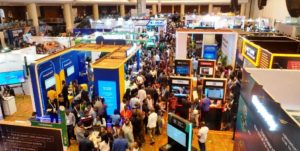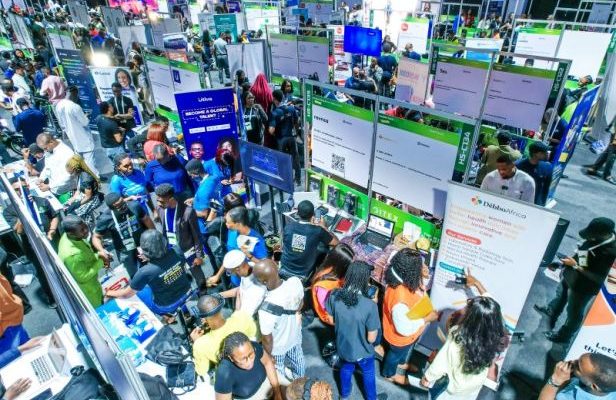By Osasómé C.O and Nana Theresa Timothy
Nigeria Hosts GITEX for the First Time

GITEX NIGERIA Day 2 Expo in Lagos
Nigeria made history this week as it hosted GITEX Nigeria 2025, the nation’s debut edition of the world-renowned technology and startup show. Officially announced in May 2024 at GITEX Africa in Marrakech, the Lagos expo was preceded by the Government Leadership & AI Summit in Abuja, bringing together policymakers, global investors, ICT leaders, and local startups.
RELATED: A Launchpad for Africa’s Tomorrow’: Says H.E. Babajide Sanwo-Olu at GITEX NIGERIA 2025
Lagos Positioned as Africa’s Innovation Capital
At the opening in Lagos, Governor Babajide Sanwo-Olu highlighted the state’s rising role in Africa’s innovation economy. He noted that Lagos has attracted over $6 billion in foreign direct investment (FDI) into its tech startup ecosystem between 2019 and 2024. He added that Lagos now accounts for 70% of Nigeria’s tech inflows, producing most of Africa’s unicorns, including Flutterwave and Andela.
“Lagos is no longer aspirational—it is a living reality. We are not just showcasing technology today; we’re forging partnerships that will help Nigeria achieve its $1 trillion economy target by 2030,” Sanwo-Olu said.
Federal Government Boosts Digital Economy
Nigeria’s Minister of Communications, Innovation and Digital Economy, Dr. Bosun Tijani, unveiled bold federal initiatives including:
- Funding 75 new research projects starting October 2025.
- Building hyperscale data centres with global partners to secure data sovereignty.
- Deploying a 90,000 km national fibre backbone under Project BRIDGE to connect every state and local government.
- Expanding the 3MTT Skills Program, one of the largest digital skills initiatives globally.
Tijani emphasized that Nigeria’s ICT sector now contributes 16–18% of GDP, with projections to reach 21% by 2027, outpacing oil and cementing Nigeria’s role as a digital-first economy.
NITDA: Nigeria is Ready to Lead the Future Economy
The Director-General of NITDA, Kashifu Inuwa Abdullahi, stressed that Nigeria is ready to lead Africa’s future economy, describing GITEX as a turning point for the nation’s tech ecosystem. He recalled how the cashless policy over a decade ago catalyzed fintech growth, creating a pipeline of startups that now dominate Africa.
“Of the eight or nine unicorns in Africa, five originated from Nigeria. That’s not by chance—it is resilience and deliberate policy,” Abdullahi said.
Global Recognition and Startup Opportunities
Ms. Trixie LohMirmand, EVP of Dubai World Trade Centre and CEO of KAOUN, praised Nigeria’s ingenuity-driven innovation, calling Lagos a “mega high-speed test bed” for global technology solutions.
The debut edition attracted 650 startups, 200 investors, and participants from over 40 countries. They include global players such as Cisco, Huawei, IBM, Kaspersky, MTN, and Meta. All of them shared the floor with Nigerian innovators in areas like healthtech, fintech, green energy, mobility, and AI solutions.
Benefits for Nigeria’s Digital Economy and ICT Companies
- Global Market Access: Nigerian startups gain exposure to investors, corporates, and government delegations from 40+ countries.
- Increased FDI: With Lagos already attracting $6 billion in tech FDI, GITEX Nigeria is expected to boost investor confidence.
- Policy Alignment: Federal and state governments are embedding ICT as a pillar for achieving Nigeria’s $1 trillion economy target.
- Job Creation: With programs like 3MTT, BDIC, and research grants, thousands of Nigerian youth will access digital jobs globally.\
- Boost for Local ICT Firms: Nigerian solution providers are co-creating with global tech giants, opening new partnership opportunities.
A Meeting Ground for Investors and Innovators
Minister Tijani closed with a call for collaboration:
“Government investment alone cannot deliver the transformation we seek. The opportunity and responsibility now rest with startups, corporates, academics, and global partners. Together, we can accelerate the digital economy—not just for Nigeria, but for Africa and the world.”
Local companies and government agencies that participated include Tranter IT, SBTS, and Wema Bank among others.
GITEX Nigeria was uniquely staged across two cities—Abuja and Lagos —and three separate venues. It showcased an impressive test of space management and logistics.






























